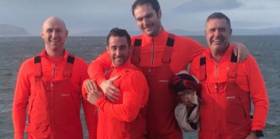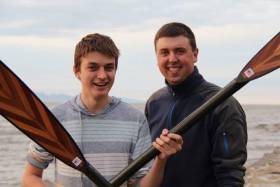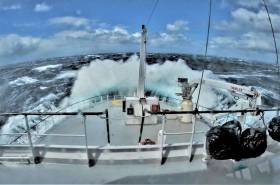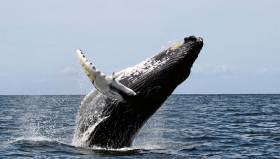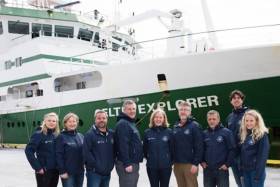Displaying items by tag: Atlantic
Welshman on Atlantic Rowing Voyage Found Dead at Sea
A Welshman in his 50s has been found dead on his boat during an attempt to row solo across the Atlantic, as BBC News reports.
Michael Holt had set out from Gran Canaria on 27 January with the aim of reaching Barbados in the Caribbean on a charity fundraiser voyage he expected to take between 50 and 110 days.
But less than four weeks and 700 miles into the challenge, the 54-year-old reported feeling seasick which he attributed to a bad reaction to antibiotics, and he rerouted towards Cape Verde some 300 miles south.
Fears for his welfare grew when contact was lost last week, and on Sunday evening (25 February) his death was announced online.
Holt, who had type 1 diabetes, was found dead in the cabin of his ocean-going rowboat by the crew of a fishing vessel that answered an emergency call.
BBC News has more on the story HERE.
Key Atlantic Ocean Circulation System "On Route to Tipping", Dutch Scientists Forecast
A key Atlantic ocean circulation system regulating temperature is “on route to tipping”, a new study warns.
The European climate is greatly affected by the Atlantic meridional overturning circulation (AMOC), and research by Dutch scientists indicates that it is already on track towards a sharp shift.
Ireland’s climate could become similar to Iceland, Fianna Fáil senator Thomas Byrne has warned.
As the paper by University of Utrecht scientists in the journal Science Advances explains,the AMOC is an ocean circulation system extending from the Tropics up to the Arctic Circle, which transports heat, salt and nutrients.
It can be affected by input of freshwater in the north Atlantic, and rapid melting of Greenland’s glaciers and Arctic ice sheets may already be slowing the course of the warm ocean water from the south.
The last collapse of AMOC is believed to have occurred over 10,000 years ago, and any repeat would have serious consequences for many parts of the globe.
The scientists fed in results of the first “tipping event” into a community earth system model which included the “large climate impacts” of a collapse.
“Using these results, we develop a physics-based and observable early warning signal of AMOC tipping,”they explain.
“Reanalysis products indicate that the present-day AMOC is on route to tipping,”they state.
“The collapse of AMOC – while it may not be something that happens in our lifetime – would have serious consequences for future Irish generations,”Senator Thomas Byrne said in the Senate.
It could result in Ireland’s climate changing to become similar to Iceland’s, which is something that will have profound implications,”he said, warning that Ireland needed to prepare for such an event.
The study by Dr René van Westen, Michael Kliphuis and Henk A. Dijkstra of the Institute for Marine and Atmospheric Research at Utrecht University is published in Science Advances here
Marina For Westport Proposed As Major Local Facility And Vital Link For Cruising Atlantic Seaboard
The almost absurdly picturesque township of Westport at the head of Clew Bay has been variously acknowledged and nationally recognised as “Ireland’s Best Place to Visit”, and Ireland’s “Best Place to Live”. Even if dedicated misanthropes would argue that any self-respecting township - however lively and easy it is on the eye – simply can’t be both at once, there’s no doubting that hospitable and facilities-rich Westport has an impressive array of factors in its favour.
Yet this only adds to the frustration of cruising folk making their way along Ireland’s Atlantic seaboard, when they make a diversion into island-studded Clew Bay in the hope of savouring Westport’s numerous charms. For Clew Bay’s many islands – with a host of secret anchorages among them – are simply too much of a good thing.
 Too much of a good thing? There are so many islands and sheltered anchorages at the head of Clew Bay that it’s difficult deciding which is the most convenient for accessing Westport (lower right)
Too much of a good thing? There are so many islands and sheltered anchorages at the head of Clew Bay that it’s difficult deciding which is the most convenient for accessing Westport (lower right)
Thus it has ended up with the thriving Mayo Sailing Club having its well-furnished base at relatively remote Rosmoney, hidden among the islands and inlets a good 9.2 kilometres northwestward from Westport. Other anchorages conveniently reached from sea are wellnigh inaccessible by land unless you’re in the know on where certain tree-lined un-signed boreens are leading. And while the obvious and most direct seaward access point to Westport is to berth at Westport Quay, much of that ancient port dries or has shallow depths at low water.
 Chartlet of Westport Quay – even with a berth here, you are still 3 kilometres from Westport town. Courtesy Irish Cruising Club
Chartlet of Westport Quay – even with a berth here, you are still 3 kilometres from Westport town. Courtesy Irish Cruising Club
And anyway, Westport Quay is itself more than 3 kilometres from Westport itself, which can seem a challengingly long distance if you’d like to amble into town, but have walked no further than the length of a cruising boat’s deck for the past week. That said, Westport Quay is an attractively bustling and hospitable community in its own right, quite enough of a destination in its individuality for many of us. And if you want to hit the bright lights of the big city at Westport itself, it’s only a modest taxi fare to reach one of the best nights on the town Ireland has to offer, if you could only be secure in the knowledge that your boat is safely berthed back in Westport Quay.
But with its uneven depths and large tidal range, Westport Quay cannot provide that guarantee. So not surprisingly, noted Clew Bay sailor Alex Blackwell – better known for his ocean voyaging – has been spending some of his time at home in Mayo during the past decade and more in sussing out the possibilities of providing acceptable modern berthing at Westport Quay, complete with the expected facilities such as a Travelhoist.
 Ocean voyagers Alex and Daria Blackwell of Clew Bay. While they keep their 57ft ketch Aleria in a secret anchorage among Clew Bay’s mny islands, Alex is well aware that visiting boats need more immediate access to shoreside facilities
Ocean voyagers Alex and Daria Blackwell of Clew Bay. While they keep their 57ft ketch Aleria in a secret anchorage among Clew Bay’s mny islands, Alex is well aware that visiting boats need more immediate access to shoreside facilities
Having built up a cohort of like-minded folk in favour of the idea, they have recently been presenting the idea to stakeholders including the local community, tourist interests, boating enthusiasts, the Chamber of Commerce and Mayo County Council, and they’ve been much encouraged by the favourable response.
The scheme – which could in its entirety provide 130 berths – is in two parts. The first phase depends on the installation of a proper sea lock – not a time-constricting tidal gate – at the west end of the river-like stretch of the harbour beside Westport Quay’s attractive waterfront. Provided the sea lock can offer extensive time options for access to the lower channel (which admittedly has shoal sections) and the open sea beyond, it will give significant freedom of movement for boats based in the enclosed berths, pontoon berths which can be provided without the need for extensive and expensive dredging.
 Phase 1 of Westport Marina would be provided by a tidal retention barrier and a sea lock.
Phase 1 of Westport Marina would be provided by a tidal retention barrier and a sea lock.
Phase 2 is the more ambitious project of dredging the lagoon area close to the westward, immediately south of Roman Island. This is a major concept, as it includes a multi-berth accessible-all-tides marina and 40 acres of recreational water right beside the heart of Westport Quay.
 The much more ambitious Phase 2 would involved dredging, but it would provide highly-accessible recreational water space in addition to extra all-tide berths
The much more ambitious Phase 2 would involved dredging, but it would provide highly-accessible recreational water space in addition to extra all-tide berths
From the wandering cruising person’s point of view, the possibility of a secure berth in the heart of civilisation will offer an attractive change from the rugged offshore islands and remote anchorages which fill much of the menu in a Connacht cruise. And from a strategic point of view, Westport is one of the most westerly points providing direct access to Ireland’s railway network. Longer term berthing in a marina at Westport Quay would offer all sorts of fresh and accessible cruising possibilities on the Atlantic seaboard from most of Ireland’s major conurbations.
Be warned, however, that if you rail your way down to Westport with a crew just let off the leash after some intensive weeks of work, it may take a will of iron to head immediately to the boat from the train, instead of pausing “just for a minute” to savour the entertainments of Westport in a place like Matt Molloy’s. For he’s a sailing man himself, and you know what it’s like when people get talking about boats.
 Matt Molloy of Westport – he would as soon talk about boats as his famous music
Matt Molloy of Westport – he would as soon talk about boats as his famous music
Irish Woman Karen Weekes Prepares for Atlantic Solo Row
Sailor, kayaker and climber Dr Karen Weekes is training to become the first Irish female to row solo across the Atlantic.
As Times.ie reports, Weekes aims to set out in December of this year to row 3,000 miles from La Gomera in the Canaries to Antigua in the Caribbean.
If she completes it, Weekes will be only the 20th woman to row any ocean on the globe solo.
Weekes, who is from Kilkenny and lives in Kinvara, Co Galway, holds a doctorate in sports psychology, and lectures at Munster Technological University.
She has sailed the Atlantic twice, circumnavigated both Ireland and the Lofoten Islands off Norway in a kayak, and has cycled solo and unsupported 4,000 miles across Canada, through Alaska and the Yukon.
She has also solo cycled from Nordkapp in northern Norway to Helsinki in Finland.
Along with Orla Knight, a physical education teacher at Castletroy College in Co Limerick, she cycled across North America from San Francisco to Washington DC.
Weekes has trekked in Nepal and Pakistan and climbed Mount Kilimanjaro and Mount Kenya.
“Big seas, potential capsize, severe weather or marlin attacks” might explain why only 19 women world-wide have ever completed solo ocean rows, she says of her latest adventure.
Weekes focuses on women’s empowerment as part of her “#shecando2021” campaign, which is seeking sponsors for the effort.
She says the campaign is “dually focused”, in following her preparation for, and experience during the voyage, and “providing a platform for encouraging women, and girls, to believe in their abilities to succeed”.
Read more on Times.ie here
Northern Irish Crew On Track in Atlantic Rowing Race
#Rowing: Home to Portrush and Relentless, from Cork and Dublin, look set to finish the Atlantic Challenge race in under a week. The Northern Irish crew has taken a clear fifth place and are putting in good mileage each day – they covered 88 nautical miles (163 kilometres) moving into the 27th day of the race from the Canary Islands to Antigua. The crew of George McAlpin, Ally Cooper, Gareth Barton and Luke Baker had 459 nautical miles (850 km) to the finish.
One place behind them lie another four, Relentless. The Cork/Dublin crew have also benefitted from the favourable winds. If they continue their fine progress they will land in English Harbour in Antigua just one day after Home to Portrush, on January 15th.
Solo oarsman Damian Browne has crossed the 1,000 nautical mile mark and has been punching in very steady times after coming through capsizes, an injured face and a damaged steering system. The Galway man, who rows as Gullivers Travels, is projected to finish on Valentine’s Day, February 14th.
Browne 'Bloodied but Unbowed' after Capsize
#Rowing: Damian Browne twice capsized and suffered facial injuries but has continued to row in the Atlantic Challenge race. The Galway man, who competes as Gullivers Travels, posted a remarkable video on his Facebook page below telling of how he had been woken by his face “getting smashed off the side of the cabin”. He made light of the cut, which bled profusely, and the other injuries. The hours following brought another capsize and sighting of a whale which circled his boat and made eye contact with him. Browne and the two other boats from Ireland in the race, Relentless and Home to Portrush, are two weeks into the race from the Canary Islands to Antigua.
Atlantic Rowers Rescued Off West Cork Days Away From Record
#Rowing - Dubliner Brian Conville is recovering in Tralee Hospital after being rescued by the Irish Coast Guard about 160 miles off Mizen Head this afternoon, writes Tom MacSweeney.
Experienced offshore rower Conville, 25 — who last year crossed the Pacific Ocean from California to Hawaii over 48 days — had been attempting to set a west-to-east record from Newfoundland with Joseph Gagnon, a 20-year-old science student from Quebec.
They set off from St John’s Harbour in Newfoundland a fortnight ago, originally intending to head for France, but had changed their plans and rerouted for the Irish coast, hoping to reach West Cork within the next few days.
Those plans were scuppered this morning when the pair’s boat overturned, activating its EPIRB signal which was picked up by Valentia Coast Guard.
Waterford’s coastguard helicopter Rescue 117 was quickly dispatched for a successful airlift of the two casualties, who have been treated for mild hypothermia but are said to be in good spirits, according to RTÉ News.
Speaking about the rescue, the Irish Coast Guard’s Gerard O’Flynn said: “It highlights that if you can raise the alarm and stay afloat, then you stand a very good chance of being rescued.
“I also want to compliment the helicopter crew and Valentia [station] on a very successful operation and thank the Air Corps for their support.”
Had Conville and Gagnon completed their voyage, they would have been the second Atlantic record-setters this year after solo rower Gavan Hennigan paddled in the Talisker Whisky Atlantic Challenge this past February.
#ClimateChange - Preliminary results from the recent ‘health check’ of the Atlantic Ocean suggest a greater penetration of manmade chlorofluorocarbons (CFCs) further into the deeper ocean since 20 years ago.
As previously reported on Afloat.ie, an Irish-led international team of marine scientists from six countries set out from Newfoundland on 27 April on board the RV Celtic Explorer, to survey a transect of the Atlantic last measured two decades ago and investigate the impact of climate change on the deep ocean.
Explaining the team’s findings, Dr Evin McGovern of the Marine Institute and principal investigator on the GO-SHIP A02 survey said: “Although these chemicals have been phased out, they remain in the atmosphere and enter the ocean, where over time, they travel to the deep ocean.
“We measure the CFCs to tell the age of the water masses in the deep ocean and this helps us assess the uptake of fossil fuel carbon from the atmosphere and penetration into the deep ocean.”
The survey formed part of the Global Oceans Ship-Based Hydrographic Investigations Programme (GO-SHIP), which carries out systematic and global surveys of select hydrographic sections, through an international consortium of 16 countries and laboratories.
This was the first GO-SHIP survey to involve such a level of collaboration, with scientists from 10 leading universities and research institutes representing six countries.
Canadian Ambassador to Ireland Kevin Vickers visited the RV Celtic Explorer to meet the team in Galway following their arrival on Monday 22 May.
“This survey is a wonderful example of the Galway Statement in action as well as the longstanding collaboration on marine research between Ireland and Canada,” he said.
Marine Institute chief executive Dr Peter Heffernan added that the expedition’s scientists “are contributing to addressing some of the biggest questions for society and our interaction with our planet.”
Find out more about the survey on the Scientists@Sea blog, where the GO-SHIP team aboard the RV Celtic Explorer recorded their work and experiences.
#Offshore - Offshore yachts beware this summer after three British sailors had a lucky escape when their yacht collided with a whale and sank in the mid Atlantic.
According to Independent.ie, the trio from the Destiny of Scarborough were picked up by a merchant vessel some 400 miles north east of the Azores this past Sunday (21 May).
The Portuguese navy also dispatched to the location after receiving the yacht’s distress signal, but the men were safely returned to land at Aviles in Spain by the merchant ship.
Six Countries Team Up To Take Temperature Of The Atlantic
#MarineScience - An international team of marine scientists from six countries are currently sailing on Ireland’s national research vessel RV Celtic Explorer on a transatlantic voyage to study the impact of climate change on the ocean.
Departing from St John’s in Newfoundland on Thursday 27 April — after launching the miniature yacht Lancer a few days previously — and due to arrive in Galway on 23 May, the Marine Institute-led team of experts are surveying a transect of the Atlantic Ocean last surveyed 20 years ago to investigate carbon dioxide levels in the ocean.
The survey is essential to understand and project how carbon dioxide emissions are accumulated in the oceans and the atmosphere, as well as its effects on the acidification of the ocean.
The survey is part of the Global Oceans Ship-Based Hydrographic Investigations Program (GO-SHIP), which carries out systematic and global surveys of select hydrographic sections, through an international consortium of 16 countries and laboratories.
This is the first GO-SHIP survey to involve this level of collaboration with scientists from ten leading universities and research institutes representing six countries joining the survey.
Marine Institute chief executive Dr Peter Heffernan said: “The Marine Institute is proud to lead this truly international collaboration. This GO-SHIP A02 survey is a very real example of the Galway Statement in action: working together to better understand and increase our knowledge of the Atlantic Ocean and its dynamic systems, and promoting the sustainable management of its resources.”
The Galway Statement, signed at the Marine Institute 24 May 2013, launched the Atlantic Ocean Research Alliance between the EU, Canada and the USA.
The survey is co-ordinated by the Marine Institute and NUI Galway with research partners in Dalhousie University and Fisheries and Oceans, Canada; University of Exeter, United Kingdom; GEOMAR, Germany; Woods Hole Oceanographic Institution and Columbia University, USA; and Aarhus University, Denmark.
“Ship-based surveys are still the only way to collect the best quality measurements of fundamental physical, chemical and biological properties known as Essential Ocean Variables,” said Dr Evin McGovern of the Marine Institute and principal investigator on the GO-SHIP A02 survey.
“Although technology has provided many new methods to collect ocean measurements, there’s really no substitute for going out on the ocean on a research vessel.
“We can use satellite technology to look at certain properties the ocean surface and can deploy autonomous argo floats to take some measurements to depths of 2000, but we need to carry out ocean surveys that can measure to get a complete picture of the chemistry of the ocean at different depths up to 5,000m.
“The transect we are surveying is a really dynamic area of the Atlantic for heat transport and carbon uptake and is hugely important to informing our understanding of our global climate and how the ocean regulates our climate,” added Dr McGovern.
“The Northwest Atlantic is one of the world’s largest sinks of carbon dioxide and despite progress in our understanding there’s still a huge lack of data as it relates to climate change’s impact on the ocean and what that means for the economy and society,” said Brad de Young, a professor of physics and physical oceanography at Memorial University, Newfoundland and an Ocean Frontier Institute researcher.
“Improving our scientific understanding and developing strategic and effective solutions for safe and sustainable ocean development requires sharing of expertise, international co-operation and exchange of data and best practices. And that’s what this voyage is all about,” adds Doug Wallace, Canada Excellence research chair at Dalhousie University.




























